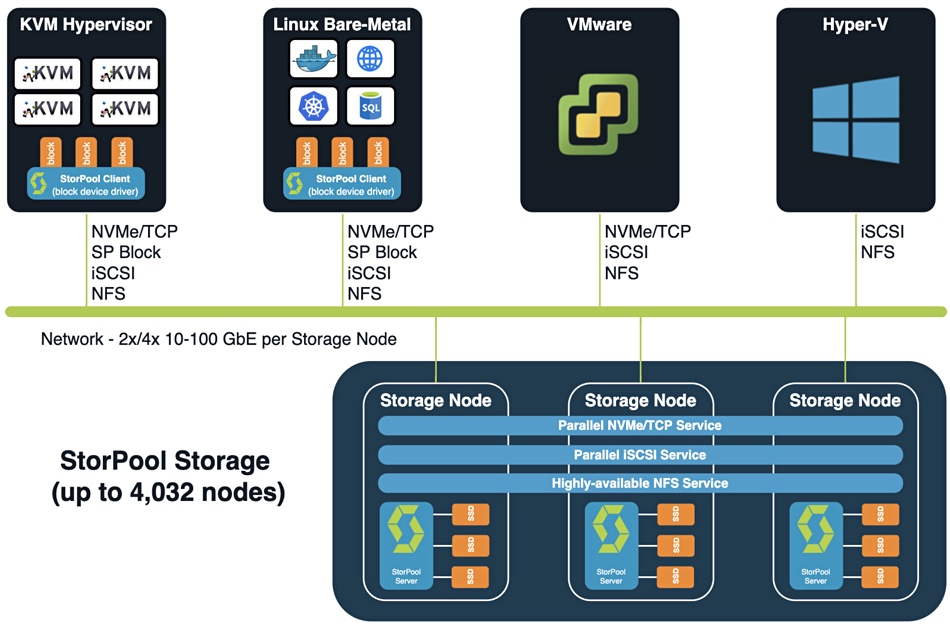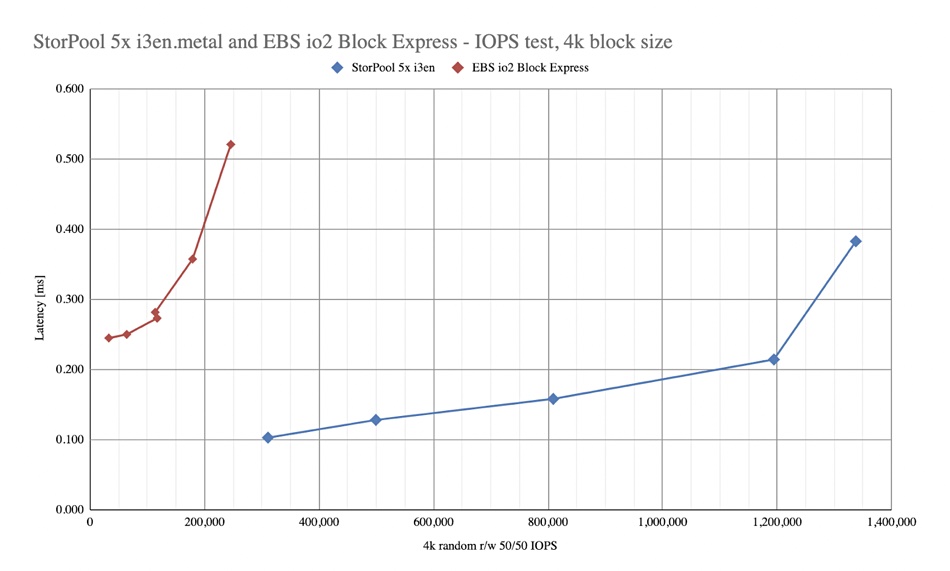StorPool Storage has added NVMe/TCP access to its eponymous block storage system, file access with NFS, and ported it to AWS.
This v20.0 release also adds more business continuity, management and monitoring upgrades, and extends the software’s compatibility. StorPool was started in Bulgaria in 2011 to provide a virtual SAN using the pooled disk and SSD storage – StorPool – of clustered servers running KVM. It has been extensively developed and improved steadily over the years since then. For example, v19.3 came along in August last year adding management features and broad NVMe SSD support. v19.4 in February brought faster performance, updated hardware and software compatibility, management and monitoring changes, and improvements in the business continuity area.
A statement from CEO Boyan Ivanov said: “With each iteration of StorPool Storage, we build more ways for users to maximize the value and productivity of their data. These upgrades offer substantial advantages to customers dealing with large data volumes and high-performance applications, especially in complex hybrid and multi-cloud environments.”

StorPool says its storage systems are targeted at storing and managing data of primary workloads such as databases, web servers, virtual desktops, real-time analytics solutions, and other mission-critical software. The company’s product was classed as a challenger in GigaOm’s radar report looking at Primary Storage for Midsize Businesses in January this year.
NVMe/TCP and NFS
The added NVMe/TCP access, which is becoming a block access standard, provides an upgrade for iSCSI access, using the same Ethernet cabling. Customers experience high-performance, low-latency access to standalone NVMe SSD-based StorPool storage systems, using the standard NVMe/TCP initiators available in VMware vSphere, Linux-based hypervisors, container nodes, and bare-metal hosts. The NVMe target nodes are highly available. If one fails, StorPool fails over the targets to a running node in the cluster.
The NFS server software instances on v20 are also highly available. They run in virtual machines backed by StorPool volumes and managed by the StorPool operations team. These NFS servers can have multiple file shares. The cumulative provisioned storage of all shares exposed from each NFS Server can be up to 50TB.
StorPool is careful to say that NFS is for specific use cases, mentioning three. Firstly, this NFS supports moderate-load use cases for access to configuration files, scripts, images, and for email hosting. Secondly, it can support cloud platform operations, such as secondary storage for Apache CloudStack and NFS storage for OpenStack Glance. Thirdly, it’s good for throughput-intensive file workloads shared among internal and external end users. Think of workloads such as video rendering, video editing, and heavily loaded web applications.
However, NFS file storage on StorPool is not suitable for IOPS-intensive file workloads like virtual disks for virtual machines.
StorPool on AWS
StorPool storage can now be deployed in sets of three or more i3en.metal instances in AWS. The solution delivers more than 1.3 million balanced random read/write IOPS to EC2 r5n and other compatible compute instances (m5n, c6i, r6i, etc.). StorPool on AWS frees users of per-instance storage limitations and can deliver this level of performance on any instance type with sufficient network bandwidth. It achieves these numbers while utilizing less than 17 percent of client CPU resources for storage operations, leaving the remaining 83 percent for the user application(s) and database(s).
A chart shows latency vs IOPS of 4KB mixed read/write storage operations on an r5n client instance. The StorPool storage system, when running on 5x i3en instances, delivers more than 1,200,000 IOPS at very low latency, compared to io2 Block Express, which tops out at about 260,000 of the same type of IOs.

Read the technical details about StorPool on AWS here.
StorPool on AWS is intended for single-node workloads needing extremely low latency and high IOPS, such as large transactional databases, monolithic SaaS applications, and heavily loaded e-commerce websites. Also, workloads that require extreme bandwidth block performance can leverage StorPool to deliver more than 10 GB/sec of large block IO to a single client instance. Several times more throughput can be delivered from a StorPool/AWS storage system when serving multiple clients.
ESG Practice Director Scott Sinclair said: “Adding NVMe/TCP support, StorPool on AWS and NFS file storage to an already robust storage platform enables StorPool to better help their customers achieve a high level of productivity with their primary workloads.”
Comment
With its 20th major release, StorPool’s storage software is mature, reliable, fast and feature-rich. Think of it as competing with Dell PowerStore, NetApp ONTAP, HPE Alletra, IBM FlashSystem, and Pure Storage in the small and medium business market, where customers may need unified file and block access in a hybrid on-premises and AWS cloud environment. Find out more about StorPool v20 here.







